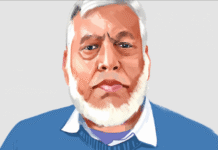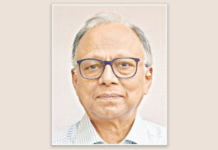Today on our effulgent Independence and National Day of pride and glory, we solemnly salute the martyrs of our Liberation War who made the supreme sacrifice for the splendid cause of freedom from alien domination. The valiant freedom fighters demonstrated the finest human values that found expression in their valour. The tyrannical forces of the military junta of Pakistan received a fitting punishment for their savagery. Bearing a stigma of everlasting disgrace on the sinful foreheads of over 90,000 soldiers, led by Lt Gen A.A.K. Niazi and Maj. Gen. Rao Farman Ali, they conceded ignominious defeat and surrendered in Dhaka. Sheikh Mujibur Rahman became the nation’s architect.
The autocratic Pakistani rulers had started digging their own graves when they denied the then East Bengal (what is now Bangladesh) its democratic rights since the inception, soon after the Partition in 1947, which tyranny was vehemently challenged under the very wise and able leadership of no other personage than the great statesman Moulana Abdul Hamid Khan Bhashani who founded the first potent opposition party, the Awami Muslim League which was later renamed Awami League. The sage statesman Bhashani could foresee that the quasi-colonialist Pakistani oligarchs would not see reason. He could anticipate the ramification of economic exploitation and political repression here—-rebellion and resistance emanating from the resolved will to right of self determination—-and accordingly alerted and inspired the masses long long ago. In 1957 the patriarch of democratic politics in what is now Bangladesh, Bhashani gave clarion call “Walaikum salam to Pakistan” (meaning ‘goodbye’) just one decade after Pakistan came into being in 1947.
The Liberation War was initially a struggle for democracy, pure and simple—-as the fascist dictatorial regime refused to accept people’s verdict—- and the masses’ resentment finally morphed into a full-scale armed struggle. It is an irony of fate that after long 43 years this wretched country is back to square one because its 20 opposition parties led by the BNP have been demanding people’s voting rights since democracy has been usurped and rendered ridiculous by the incumbent government of Awami League (AL) headed by Prime Minister Sheikh Hasina by means of appalling state terrorism through police, RAB and other forces; while terrorist arson attacks are going on—-but the government does not seem to be serious about stopping it, and pro-AL elements too have been found involved to possess homemade bombs, news reports said.
Until 22 March 2015, the death toll reached 131, among whom 70 were transport workers and passengers killed in arson attacks, while 40, mostly opposition activists, died either in police ‘shootouts’ or ‘road accidents’[Vide the New Age March 22, 2015]. The government blames the opposition men as the perpetrators, but BNP has been unambiguously denying responsibility.
As regards nabbing perpetrators of petrol bomb attacks the incumbent’s real intention is shrouded in mystery, even enigmatic. To cite one instance among many, in the heavily guarded Gulshan area on 15 February 2015 at least seven people sustained injuries when two crude bombs exploded in the middle of the procession, when Shipping Minister Shajahan Khan, top leader of the thousands of road transport workers’ union, was leading a large pro-government demonstration to lay siege to BNP Chairperson Khaleda Zia’s office, protesting blockade and hartals. [dhakatribune .com/politics/2015/feb/17]. We have repeatedly suggested high-powered judicial probe in this regard, but all in vain.
The BNP secretary-general Mirza Fakhrul Islam Alamgir has been implicated in some 80 cases. He has already been indicted in some of the cases, as reported in an English daily on 28 February 2015. Besides, Standing Committee member Gayeswar Chandra Roy, Juba Dal (youth wing of BNP) President Syed Moazzem Hossain Alal and Sylhet city BNP convener Dr. Shahriar Hossain Chowdhury were arrested in December 2014. Reporting on March 6, 2015, progressbangladesh.com said in January and February alone, at least 1,500 cases were lodged against leaders and activists of the opposition 20-party alliance all over the country. More than 20,000 have been arrested. Over the past six years an appalling number of opposition leaders and activists have been killed in mysterious circumstances or died in custody in addition to enforced disappearances of which senior leader Salahuddin Ahmed is the latest victim. Another important leader of BNP, Ilyas Ali, disappeared three years ago and till date, the government has failed to come up with any information about him.
The 5 January 2014 election, was in no way acceptable to the people of Bangladesh (90 per cent of them favoured polls under a neutral government, Org-Quest said) or the international community including the US and UN. The weird, unheard-of since Athenian democracy of the fifth century BC Greece and reprehensible farcical 5 January 2014 polls under Hasina for 300 lawmakers will go down in history here and elsewhere as a bad example of tainted election and a dangerous threat to democracy because 153 of them did not contest and yet could become chosen, unelected MPs. This has been described as “the country’s poor democratic infrastructure”. [Videbrownpoliticalreview.org/2015/01/ political-persecution-in-bangladesh/].
A beautifully settled issue was unsettled by the government of Sheikh Hasina as she sowed the seed of this absolutely unnecessary crisis which has now assumed the shape of anarchic turmoil, thank God, not yet a civil war. She was all out for a caretaker government (CG) to ensure free and fair general elections and launched movement for CG, joined by Jamat-e-Islami and Jatiya Party, from 1994 to1996 during which years she called Hartals and blockades for 96 days. In those programmes marked by vandalism, bomb blasts, cocktail bursts, gunshots and arson, over 50 people were killed and over 1,000 people were wounded, according to Opinion.bdnews24.com dated 10 June 2011. Will this crisis be over?
Source: Weekly Holiday









